Posted July 31, 2018 by Nicky in Reviews / 0 Comments
 The Zoo, Isobel Charman
The Zoo, Isobel Charman
The cover promises the “wild and wonderful” tale of the founding of the London Zoo, but it isn’t really very wild, though you might decide it’s still wonderful in its way. It certainly was a heck of a task, and the fact that the London Zoo still exists is amazing considering some of the difficulties they had. The style is rather fictionalised — mentioning exactly what Charman imagines the protagonists of the story think and feel — and it doesn’t always stick very closely to the founding of the zoo itself. For example, there’s a whole chapter on Darwin, at least as long as the others, and yet of all of them he has almost nothing to do with the actual business of the zoo.
It’s not all about the zoo, then, but the story it tells is an interesting one, and I did enjoy the stories of men that might have been left out of the story in another time — the first vet, the keepers, etc. The people who did the day to day work on the ground, not just the people who designed the buildings or paid for things.
A little slow, really; it was a bit too fictional to give me the sort of details I want in my non-fiction, but too dry for my tastes as a work of fiction.
Rating: 3/5
Tags: book reviews, books, history, non-fiction
Posted July 27, 2018 by Nicky in Reviews / 0 Comments
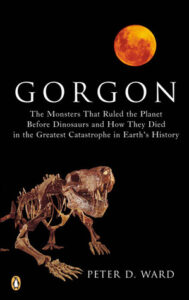 Gorgon, Peter D. Ward
Gorgon, Peter D. Ward
If you’re looking for information on the gorgonopsids and their world, this book is rather thin on that. Instead, it’s mostly about Ward’s career and some of his excavations and initiatives. Admittedly, much of that is in the service of getting information about the gorgonopsids, but the book is rather thin on what was actually found. There is some interesting stuff on pinning down that mass extinction and figuring out how fast it happened, but the gorgonopsids in life — how they lived, what they did — are absent.
So pretty interesting in terms of understanding Ward’s career as a palaeontologist, with the appropriate set pieces about how hot it was and how difficult, etc, etc, but low on actual pre-dinosaurian monsters ruling the Earth.
Rating: 3/5
Tags: book reviews, books, non-fiction
Posted July 23, 2018 by Nicky in Reviews / 0 Comments
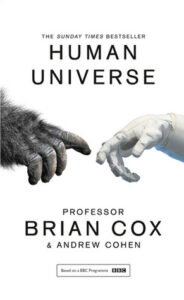 Human Universe, Brian Cox, Andrew Cohen
Human Universe, Brian Cox, Andrew Cohen
If you’re expecting something based a bit more on humans and how they evolved, remember it’s Brian Cox and think bigger — it’s more about our place in the universe, our understanding of it, and what we might find out there in the vastness of space. It’s not really about us as a species, I think, but about how we see the world around us. So yeah, more physics, less biology. Which makes sense, given the author, and it’s easier to absorb than his other book I’ve read (Universal). It goes into interesting stuff like the Fermi Paradox and the Drake Equation, which is right up my street, and it avoids too much jargon or demands that the reader understand math.
That said, it wasn’t amazing, from my point of view — mildly interesting, but not really my thing.
Rating: 3/5
Tags: book reviews, books, non-fiction, science
Posted July 21, 2018 by Nicky in Reviews / 3 Comments
 Hadrian’s Wall, David J. Breeze, Brian Dobson
Hadrian’s Wall, David J. Breeze, Brian Dobson
This is a fairly in-depth examination of the Wall and the archaeology done around it to try and understand what it was used for and at what times. As such, it’s a lot of information that most people wouldn’t expect to hold in their heads after, unless they’re deeply interested in the topic. Which is pretty much exactly why I read this, back during my exam period. I really love reading books like this that sift through the archaeology, present possible conclusions and discuss what is most likely. I don’t expect to remember this or that about the forts — no one expects me to remember it — but all the same I learned about the Romans and the British of the period, and got to connect some dots in what I know.
It’s perhaps not the most scintillating reading if you’re not pretty engaged and interested in the topic, but it’s interesting stuff and they make a good case for their ideas.
Rating: 4/5
Tags: book reviews, books, history, non-fiction
Posted July 18, 2018 by Nicky in Reviews / 0 Comments
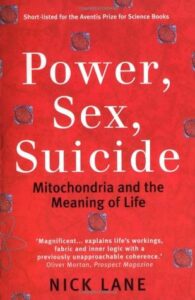 Power, Sex, Suicide: Mitochondria and the Meaning of Life, Nick Lane
Power, Sex, Suicide: Mitochondria and the Meaning of Life, Nick Lane
I read this while I was preparing for one of the final exams of my biology degree, so perhaps it’s no surprise that I found it helpful in revising some of the topics (mostly apoptosis!), but also found that knowledge useful in understanding the book itself. To me, it seemed an incredibly clear and well-written account of the role of mitochondria in life and the origin of life, and I didn’t really find any major holes in it based on what I know. If you’ve read The Vital Question, then a lot of the ideas in it aren’t new — but of course, that makes sense, since The Vital Question is a more recent book by the same author.
And since this is pop science, I should add that you don’t need the biology degree to understand it. It might be slower going and less like pleasure reading if you don’t have a solid background in science, but it should work at that level too.
I do roll my eyes a little bit at the title, which is obviously drumming up excitement by sounding provocative and then like a self-help book, but hey, maybe it’s persuaded someone on the fence to pick it up just through sounding a bit unusual for the section it’s in. It’s worth picking up, definitely.
Rating: 5/5
Tags: book reviews, books, non-fiction, science
Posted July 13, 2018 by Nicky in Reviews / 0 Comments
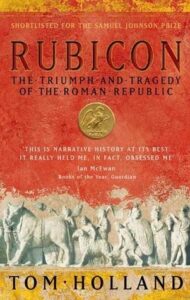 Rubicon, Tom Holland
Rubicon, Tom Holland
With a title like Rubicon, if you know about the significance of that small river, you might expect the book to be mostly about Julius Caesar (if you didn’t notice the subtitle, which differs slightly between editions but always mentions the Republic). It isn’t: in fact, at times early on you might not be quite sure what Caesar has to do with it and what’s even happening to him at the time. Which is fine: there’s plenty going on that you don’t need the big name to make Roman history interesting, but I do think it makes the title a little bit misleading. It’s not really all about that decisive moment of Caesar’s: it’s more broadly about the Republic, and the sense I got was that even if Caesar hadn’t taken the action he did, the end of the Republic would still have come.
Holland’s writing is mostly breezy and easy to follow: sometimes he gets a little too flippant or broad in his translations for my liking (I wouldn’t put it past Romans to call someone a “cocktease”, definitely, but I’ve seen that line translated rather less explosively, too), and sometimes the sheer number of events and names starts to tangle a little. He’s covering quite a lot here, really putting the moment of crossing the Rubicon into context, and it can feel both a little jam-packed and a little dry as he crams everything in.
For the most part a good read, though a fairly traditional account of the doings of men in classical history. (Give me more about Clodia and her influence!)
Rating: 4/5
Tags: book reviews, books, history, non-fiction
Posted July 11, 2018 by Nicky in Reviews / 2 Comments
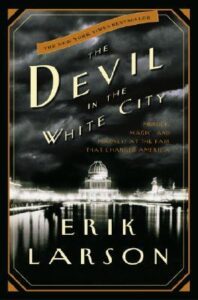 The Devil in the White City, Erik Larson
The Devil in the White City, Erik Larson
I didn’t expect this one to have me hooked, and to the extent that I was interested, I’ll admit that it was initially mostly in the true crime aspect. I didn’t know much about H.H. Holmes’ actual crimes, just a vague sense of notoriety, so that was really what I was interested in — the design of the World’s Fair, with all the architecture and infrastructure decisions, sounded kind of boring to me. I wasn’t really sure about the juxtaposition of the two, either: it seemed like the story of the World’s Fair would be boring in comparison with the horrors of Holmes’ crimes.
In the end, I was more interested in the World’s Fair sections, and I don’t know why. Partly the people discussed, I guess: they had a powerful vision, they had determination, and they achieved a lot in a very short time. Regardless of the topic, that kind of drive can be fascinating. And Larson’s writing works for me — it feels crisp and to the point, and evokes feelings and motivations that the people involved may have felt without feeling like he was going out on any limbs or fantasizing too much.
I think in the end, despite my initial sense that H.H. Holmes would be more interesting, the thing is that psychopaths are psychopaths. I’ve read about psychopaths before, but the challenges of organising the Chicago World’s Fair were a one-off thing that nobody has or could repeat in quite the same way.
Rating: 5/5
Tags: book reviews, books, history, non-fiction
Posted July 8, 2018 by Nicky in Reviews / 0 Comments
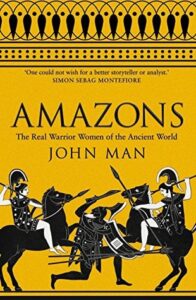 Amazons, John Man
Amazons, John Man
This was a really fun and quick read, even if it wasn’t quite what I expected. When someone says Amazons, you get a very clear picture, right? But John Man goes beyond the myth and digs into first the origins of that myth, and then into other societies which might more or less be considered Amazons (whether they were ever identified with Amazons or not). There’s also stuff on why Amazon.com is called Amazon, and other detours like that. It becomes a sort of cultural history of warrior women — and that’s not a criticism, because I found that more enjoyable than something which focused myopically on something the evidence suggests was never more than a rumour born from a rumour, or even political convenience.
And though the subtitle is all about warrior women of the ancient world, there’s a good discussion of modern warrior women too.
Overall, enjoyable — and left me very curious to read more about the Scythians and the archaeology of the people of the steppe. One book leads to another… Anyone got any recommendations along those lines?!
Rating: 4/5
Tags: book reviews, books, history, non-fiction
Posted July 6, 2018 by Nicky in Reviews / 0 Comments
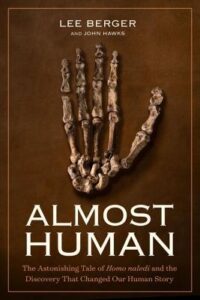 Almost Human, Lee Berger, John Hawks
Almost Human, Lee Berger, John Hawks
Way back possibly even before I was doing my biology degree, I was doing all the MOOCs (massively open online courses) I could, and one of them was run by John Hawks. So when I stumbled across this book I had to have it. I’ve always been vaguely aware of and interested in what’s understood about hominin evolution, but I mostly knew about the big classic hits like Lucy. Homo naledi, discussed in this book, is new and rather surprising.
The story of excavating the remains is also pretty fascinating, with a team of female scientists picked for their ability to wriggle into the cave systems to retrieve the items, and all the science and planning that went into understanding what was happening. The book does also include some info on Berger’s career in general, which is less interesting to me, but his excavations of hominin remains… it’s all astounding and exciting to me.
Knowing that Berger’s work can be controversial, I’d love to read some other takes on the same info. I might even dig into the journals while I still have access, before my degree’s done. Either way, it’s fascinating stuff, though.
Rating: 4/5
Tags: book reviews, books, non-fiction, science
Posted July 2, 2018 by Nicky in Reviews / 0 Comments
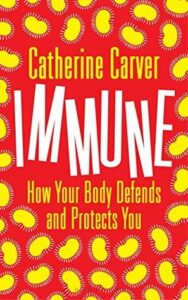 Immune, Catherine Carver
Immune, Catherine Carver
I’m not entirely the audience for this one, since I know the subject from a reading-scientific-papers and writing-a-dissertation-on-tuberculosis level, and this is like the other Bloomsburg Sigma books aimed at a casual, pop-science kind of audience. Not a bad thing, but if you’re here to seriously buckle down and learn (e.g. because you have an immune condition), then it’s going to feel far too light and flippant, and the focus will be all wrong. For me, it was a good opportunity to revise my understanding of some of the topics I’ve been learning about, and see an alternate way to describe them, but it’s nothing new and Carver couldn’t get me more excited than I already am about the subject.
A couple of times the topics lean towards the memorable and thus aberrant things like the boy who grew up and lived entirely in a bubble due to immune problems; this can be fascinating, but you could see it as an element of sensationalism in a topic that needs no sensationalising to be fascinating and deeply relevant to all of us. After all, the same illnesses and malfunctions await all of us if our immune systems fail, and our immune systems are the only things that really have a hope of continuing to be effective against the pathogens around us in the long run.
Rating: 3/5
Tags: book reviews, books, non-fiction, science
 The Zoo, Isobel Charman
The Zoo, Isobel Charman








